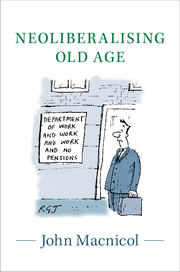5 - Retirement
Published online by Cambridge University Press: 05 November 2015
Summary
Why do people retire? The question may seem odd in the twenty-first century, when retirement has become democratised and universally accepted as a stage of life – so much so, that old age has increasingly become a welfarist concept, associated with permanent withdrawal from paid work and receipt of a state pension. Yet it was not always so. As noted in Chapter 1, in the predominantly rural economy that existed before the nineteenth century, male and female agricultural workers continued working for as long as they could, generally moving to less physically demanding jobs as they aged with Poor Law outdoor relief supplementing their diminishing earnings, terminating in ‘infirmity’ retirement. To some extent, this practice was observed in small industrial enterprises in the nineteenth century: ‘old servants’ whose individual productivity was declining but who had been with the firm for a long time would be kept on and allotted light tasks (such as storekeeper).
With industrialisation and the greater separation of home and formal work, the labour force participation of married women fell, so that by the end of the nineteenth century the concept of retirement had little meaning for them. From the 1880s onwards, a new kind of retirement gradually spread down the age structure, affecting first men – and then women, as their participation in the labour force increased in the second half of the twentieth century. This was ‘jobless’ retirement, caused primarily by a gradual shrinking of those labour market sectors that employed older workers and secondarily by an increasing emphasis in personnel practices on individual productivity: older workers deemed to be ‘past their best’ when aged in their mid- or late sixties would be eased out of employment by various means. Of course, ‘jobless’ and ‘infirmity’ retirement have always overlapped – ill-health is today the most frequently cited reason for labour force exit, and there is a merging of disability, unemployment and male ‘early’ retirement – but the distinction between the two is heuristically useful.
Mass retirement is therefore a phenomenon of the last 130 years. Its principal cause has been long-run economic restructuring, or diminishing labour market demand in those sectors in which older workers have predominated.
- Type
- Chapter
- Information
- Neoliberalising Old Age , pp. 87 - 135Publisher: Cambridge University PressPrint publication year: 2015



